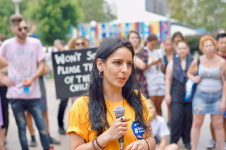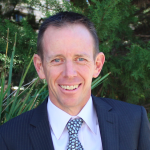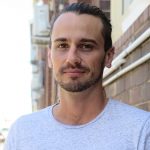Youths Demand Pill Testing to Stop Deaths: An Interview With SSDP’s Sofia Devetak

Decades ago, the Just Say No campaign was launched by Nancy Reagan, wife of then US president Ronald Reagan. Comprised of the simple idea that telling children to say no to illicit substances would somehow stop drug use, the campaign has subsequently been hailed as a monumental flop.
“We ask young people not to do it,” NSW premier Gladys Berejiklian said in regard to her government’s stuck-in-the-eighties approach to illegal drugs, following the suspected drug-related death of Alex Ross-King at a music festival two weeks ago. She was just 19 years old.
As the Liberal Nationals government doesn’t quiet 100 percent trust its Reagan-esque abstinence approach itself, the authorities have also been steadily increasing police and drug dog presence at festivals over recent years.
This is despite harm reduction experts and medical professionals asserting that a heavy police presence does not prevent drug use, but rather it encourages young people to dangerously take larger amounts of drugs at once in order to evade detection.
This present music festival season has seen some of the heaviest policing at these events in NSW history. And the drug-related death toll is now at its highest, with five dead in five months. And while it’s difficult to prove the correlation, it’s not difficult to see a way out of this scenario.
It’s based on evidence
The family of Alex Ross-King called on Ms Berejiklian to introduce pill testing services at festivals just days after their daughter passed away. These services allow medical professionals to warn festivalgoers whether the drugs they propose to take could prove fatal.
Pill testing has been implemented in certain European countries for over two decades. And it continues to be so as it’s proven to save lives. A trial at Canberra’s Groovin the Moo festival last April potentially saved the lives of two punters whose pills contained a substance that can prove lethal.
However, Berejiklian isn’t having it. She’s refused to consider trialling pill testing since the first two festival deaths at Defqon.1 back in September. And as the casualties increased, she’s continued to deny it, stating she’d only consider it if someone would show her the evidence that it works.
Their lives are a stake
As the dinosaurs in NSW parliament continue to agonise over whether they’re seen to be tough on drugs as that March ballot box draws nearer, young people are dying at unprecedented rates at festivals. And if the beginning of the season is anything to go by, there could be more deaths soon.
That’s why Students for Sensible Drug Policy (SSDP), in conjunction with DanceWize, have just launched #BeHeardNotHarmed. It’s the first youth-led campaign in support of pill testing, which is an issue that primarily involves the lives and health of young people.
Sydney Criminal Lawyers spoke with SSDP NSW coordinator Sofia Devetak about the importance of having a campaign led by young people, the necessity of implementing pill testing and what’s entailed in the campaign, which will be officially launched in Sydney on 21 February.
Firstly, Students for Sensible Drug Policy has just launched Be Heard Not Harmed. It’s the first youth-led pill testing campaign in this country. Sofia, what’s the importance of having a campaign run by young people coming to the fore?
If you consider the recent deaths that have occurred at festivals, you can see that none of these people were past the age of 23. This is an issue that affects young people in particular, yet we have no youth representation.
It’s become evident that we cannot leave this matter to a demographic of politicians that are much beyond our age group. They seem unable to understand youth and music culture from a sociologic and an anthropologic perspective.
They have no connection and resonance with the things that we do, the things we feel and the things that make us a community. So, these people are the ones with the greatest disconnect to us in a way.
And this is why we can’t leave matters of life and death in the hands of the unknowing and seemingly unsympathetic any longer.
The campaign being carried out by SSDP – knowledgeable and compassionate young people – is giving youth an actual platform to express their concerns and their demands based on evidence, as well as the best health care intervention possible.
And as a representative of the campaign, what do you say to critics who put forth that pill testing isn’t foolproof and further, it can lead to increased drug use in the community?
Their concerns are 100 percent legitimate. And I agree that pill testing isn’t foolproof.
However, the type of technology used in pill testing services in 30 plus countries around the world is called mass spectroscopy, which is used to check drug samples against a library of about 30,000 chemical compounds.
Now, this library is growing significantly through a network of global organisations that continually add new chemicals to it. That’s a huge amount of potentially lethal substances that can already be tested in order to save lives.
This technology isn’t always able to identify the exact nature of every new drug. But, what it can do is detect the presence of an unknown substance.
Once that presence is detected, these drug samples become red flags. And advice is given to those individuals with those samples to dispose of those drugs.
At the Groovin the Moo festival, even though they weren’t able to say the substance was NBOMe, just the very fact that it was an unknown substance was enough to red flag it. And these people didn’t consume what was confirmed to be a lethal pill.
Apart from lethally contaminated pills, some deaths and hospitalisations may in fact be due to an overdose of MDMA. Pill testing serves to measure the purity of pills, some of which are significantly pure.
Now, advice is given to those individuals with a very pure MDMA pill to avoid taking multiple pills in case of an overdose. That’s harm reduction in action.
Evidence has shown that about 70 percent young people do dispose of their drugs when they are told they are likely unsafe, or they have unknown substances.
The evidence shows that it does not increase drug use. It’s actually shown the opposite in some trials.
So, at present, you’re a student. And you’re out there hearing what other students have to say. What is the general opinion on campus in regard to pill testing and this season’s rising death toll?
Most people that I speak to on campus have lost faith that the government can look after them. And they feel that the youth voice is paramount in this debate more than ever.
We’re taking life and death matters into our own hands, as is SSDP with our Be Heard Not Harmed campaign.
Most people want to see pill testing services implemented. And they’re confident that if they are in place at festivals or offsite that they will use them.
It’s mainly loss of faith in our politicians. And we really just want to become more forward-thinking like the 30 plus countries that implement pill testing actively now.
One of pill testing’s biggest opponents is Gladys Berejiklian. She established a festival safety panel and warned them not to even consider pill testing. And these days, she’s saying that she’d think about it if someone could show her any evidence that it works.
What do you think about the premier’s response to calls for pill testing?
Gladys may or may not have access to the evidence that pill testing works. Either way, the big problem is a fundamentally conservative attitude.
She feels she may lose the support from the older, more disconnected generation that don’t resonate with the youth on this matter. And if it is going to cost her a seat in parliament, quite frankly, I think she would not even want to look at the evidence.
She said very loudly before that she will never consider pill testing. How can you truly be open to evidence that it works if you are going to shut it down from the very beginning?
On behalf of SSDP, and all the youth organisations for harm reduction and pill testing, I say if she wants to know the evidence, our organisation, academics and experts are available anytime.
Following the tabling of the music festival safety panel’s report, the Berejiklian government announced some tough new measures supposedly aimed at increasing festival safety.
One of these was a law that was passed in late November that potentially means an individual can be imprisoned for up to 20 years for supplying another person with a drug that turns out to be lethal. What did you think about this response by government?
Unfortunately, this penalises the weakest link in the drug chain. This is a scare tactic. And it would only apply to the individuals who are least responsible for contaminants in drugs.
They should really be targeting the rogue manufactures that are making these pills in the first place. The ones that see huge amounts of money coming back to them. The ones who have the biggest and most corrupt criminal structures in place. And the ones with the biggest distribution power.
Where are the measures implemented to target them? Because they are the biggest problem in the drug market. And targeting the small guy at festivals does nothing to stop the big fish from manufacturing potentially toxic drugs.
Pills will still be sold outside of festivals. They will be sold on the streets, at homes and smaller events. And unfortunately, these areas don’t have harm reduction specialists and medics to attend to medical emergencies.
It just drives more deaths and more harms to occur outside of the festival scene. And frankly, it seems like a lazy alternative to get into the real work of finding the big fish, finding the real criminals and implementing life-saving services like pill testing.
But, while the government stalls on pill testing, NSW authorities continue to utilise law enforcement methods at festivals, such as sniffer dogs and saturation policing.
What sort of an effect would you say taking this approach is having on young people?
With heavy policing, sniffer dogs and big police presence at festivals, the main thing is that it brings about an environment of fear. And fear does not allow people to look after themselves and be looked after properly.
This fundamentally leads to more deaths and more harms. We’ve seen a lot of examples where people have ingested multiple drugs straightaway – several pills at the same time – due to the very fact that a police officer was approaching them.
When they see police officers outside of a venue, these people tend to do the same thing, as nobody wants to be penalised.
Nobody wants their parents to be called by the cops. And nobody wants to lose their reputation or be threatened by individuals, who serve to intimidate more than educate.
This environment of fear essentially moves people away from actually seeking helpful medical and educational services.
The Be Heard Not Harmed campaign was launched on 16 January. What sort of practical actions will the campaign entail moving ahead?
We pride ourselves on the fact that it is a very logistical and structured campaign. So, there will be quite a few things happening, such as festival engagement.
We had quite a bit of presence at the Strawberry Fields festival. We had petitions, and education at the DanceWize Victoria tent as well.
Organisations like Banana Bus and other festival organisers are behind the campaign. And they’re going to help us distribute the information and make it as loud as possible.
The Be Heard Not Harmed campaign – which was launched in Victoria last week – is going to be launched in Sydney on the 21 February.
There will be nightlife venue operations as well. There you will be seeing campaign materials, harm reduction information and communication with the right people. And we’ve got ten university chapters that are running forums and educational events.
We are trying to get the right people to listen to the information on behalf of the youth.
And lastly, you addressed the recent pill testing rally in Sydney, which saw hundreds show up last weekend in support of this harm reduction approach.
At present, the debate over pill testing seems to be reaching fever pitch. Sofia, how do you see this all panning out from here?
I can mainly speak about NSW. Labor are about to announce a policy change. They’re very likely to come out in support of it and take that policy to the election.
The Liberals may see the tide as having turned and do the same, or they may double down on their law and order policies. Of course, they want to present themselves as the tough alternative to Labor’s bleeding hearts.
In that case, only Labor winning the election or sadly, another spate of festival deaths will create a change.
The Greens are doing a lot of pro pill testing work. And you’re seeing more and more MPs from different parties supporting pill testing, which is amazing to see.
Unless, Labor is going to fully support it, we’ll unfortunately see more deaths and harms before a change is created. But, that’s why we’re here, to avoid that.







